New Years Addresses: The Caspian Region in 2025
Author: Nicholas Castillo
01/03/2025
In much of Eastern Europe and Eurasia, New Year’s Eve remains the central holiday of the year and Presidential New Year’s addresses remain a major political tradition. This is no less the case in the South Caucasus and Central Asia. This year saw the national leaders of the region reflect on the events of 2024 and the major trends they see for the future.
The leaders of the Caspian region are now looking toward the new year with ambitious plans. In Central Asia, these are largely economic or environmental projects, focusing on regional connectivity and growing industries. In the South Caucasus, New Year’s addresses took on distinct political tones, showing that the region remains embroiled in contentious politics. These will likely be the key dynamics to watch throughout the region in the year to come.
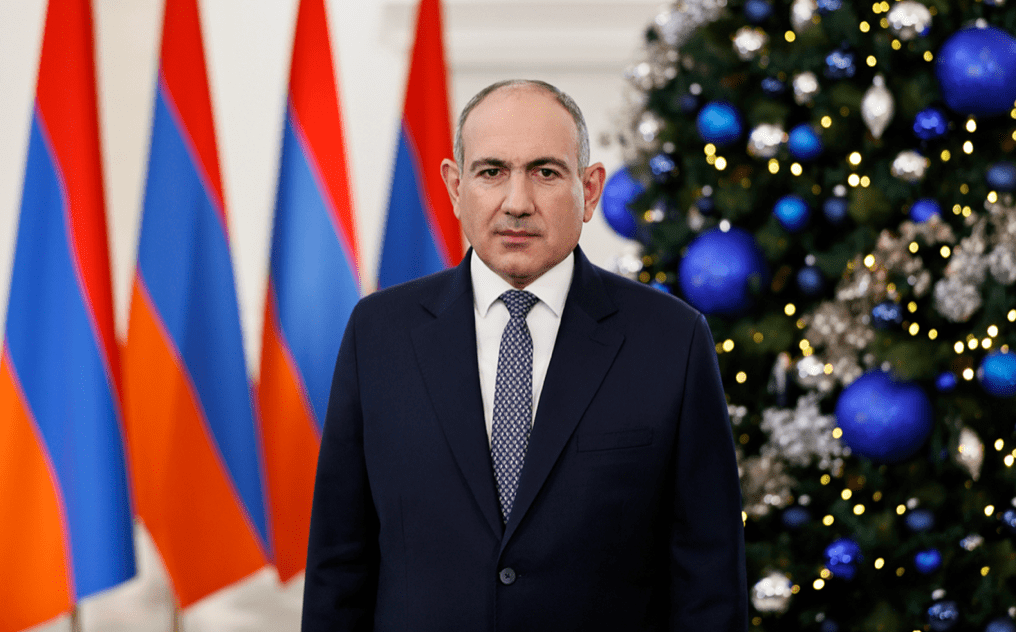 Photo Source: Prime Minister of the Republic of Armenia
Photo Source: Prime Minister of the Republic of Armenia
Armenia
Armenia’s Prime Minister Nikol Pashinyan delivered an address that reflected his ongoing attempt to re-shape Armenia’s future by way of peace-making with Yerevan’s neighbors, pivoting Westward geopolitically, and leaning into regional-connectivity. Pashinyan described this as the “ideology of Real Armenia,” a framing he had premiered earlier in 2024, and promised citizens that the approach "gives us the opportunity to move forward, that gives us the opportunity to implement the agenda of the durability of statehood, independence.”
Pashinyan also advocated specifically on behalf of his peace efforts with neighboring Azerbaijan, instructing viewers to go to “see the demarcated Kirants with your own eyes” a region that has seen a border with Azerbaijan demarcated for the first time, “and it will be clear to you what we mean by saying independence, security, what we mean by saying Real Armenia and Peace Agenda.”
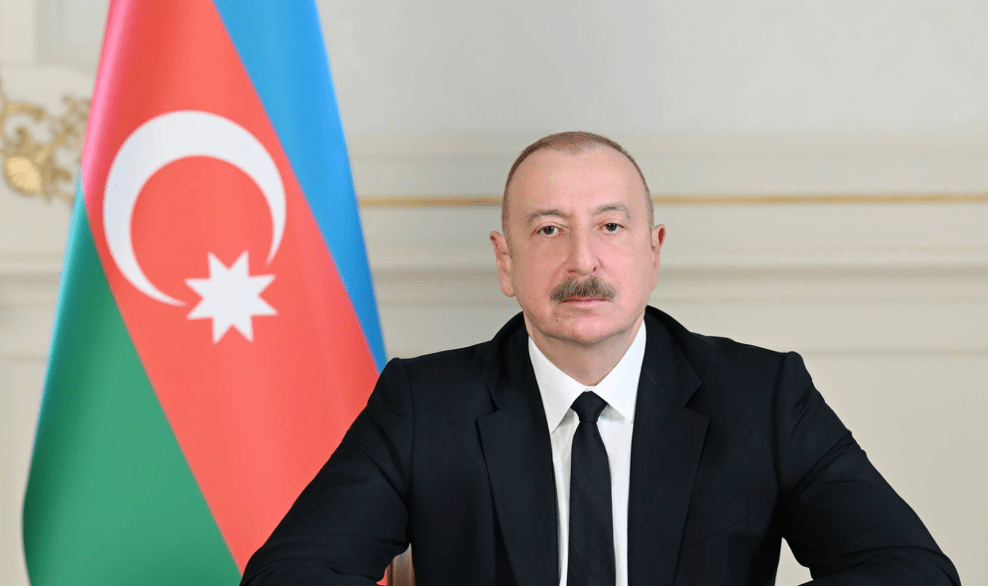 Photo Source: President of the Republic of Azerbaijan
Photo Source: President of the Republic of Azerbaijan
Azerbaijan
In his New Year’s speech, Azerbaijani President Ilham Aliyev recounted a number of successes for Baku in the last year. Economically, he noted that gross domestic product as well as non-oil sectors had all increased. Aliyev also underscored Azerbaijan’s successful COP 29, which he described as the largest and most important international event Azerbaijan has ever hosted.
Aliyev touched upon Armenia in his statements, concerned over another potential military build-up in Armenia. He stressed that Azerbaijan had seen the return of several villages in 2024 that Armenia had occupied during the first Nagorno-Karabakh war of the 1990s. Noting Azerbaijan’s increased “political and military power,” the Azerbaijani President said, “I hope that from now on Armenia, while pursuing its policies, will continue to take into account the new realities created in the South Caucasus...”.
President Aliyev also noted that from 2021 to the present, Azerbaijan has allocated more than $11 billion for the restoration of the Karabakh and East Zangezur economic regions, highlighting that implementation of the “Great Return Program” will continue to be a priority for the country. In 2024, he noted that some 10,000 internally displaced people returned to the territories of Azerbaijan.
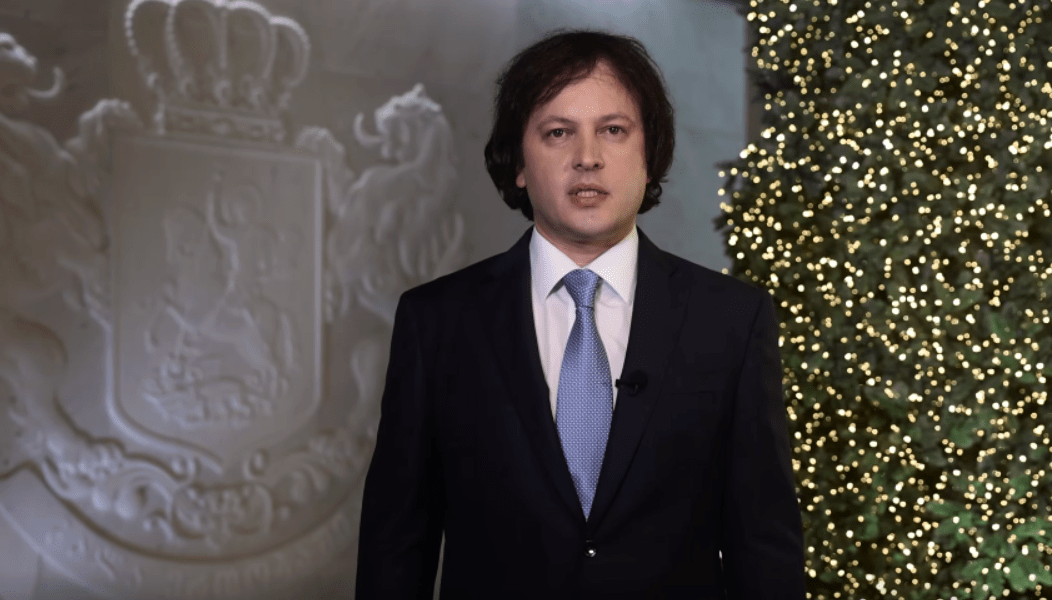 Photo Source: Prime Minister of Georgia
Photo Source: Prime Minister of Georgia
Georgia
Georgia’s Prime Minister Irakli Kobakhidze delivered a three-minute speech in which he described 2024 as a year filled with challenges but also celebrated Georgian Dream’s contested victory in the year’s elections, which opponents have refused to recognize. Kobakhidze stated that, “Georgia had to continue its unequal struggle to protect the peace, independence, and national identity; it had to fight against the hatred imposed from outside.” The Prime Minister also stated, “The year 2024 was also successful in terms of economic development. Numerous critical projects were implemented.” This is possibly a reference to major projects like a deep-sea port at Anaklia, which saw progress this year.
Reflecting its dramatic and polarized political moment, Georgia currently has two figures claiming the mantel of the Presidency. At present, the Presidential palace is occupied by Georgian Dream’s (GD) Mikheil Kavelashvili. However, the former President, Salome Zourabichvili, is still seen as and referred to as the President of Georgia by the country’s opposition. Both Kavelashvili and Zourabichvili delivered New Year’s speeches, supportive and critical of GD respectively.
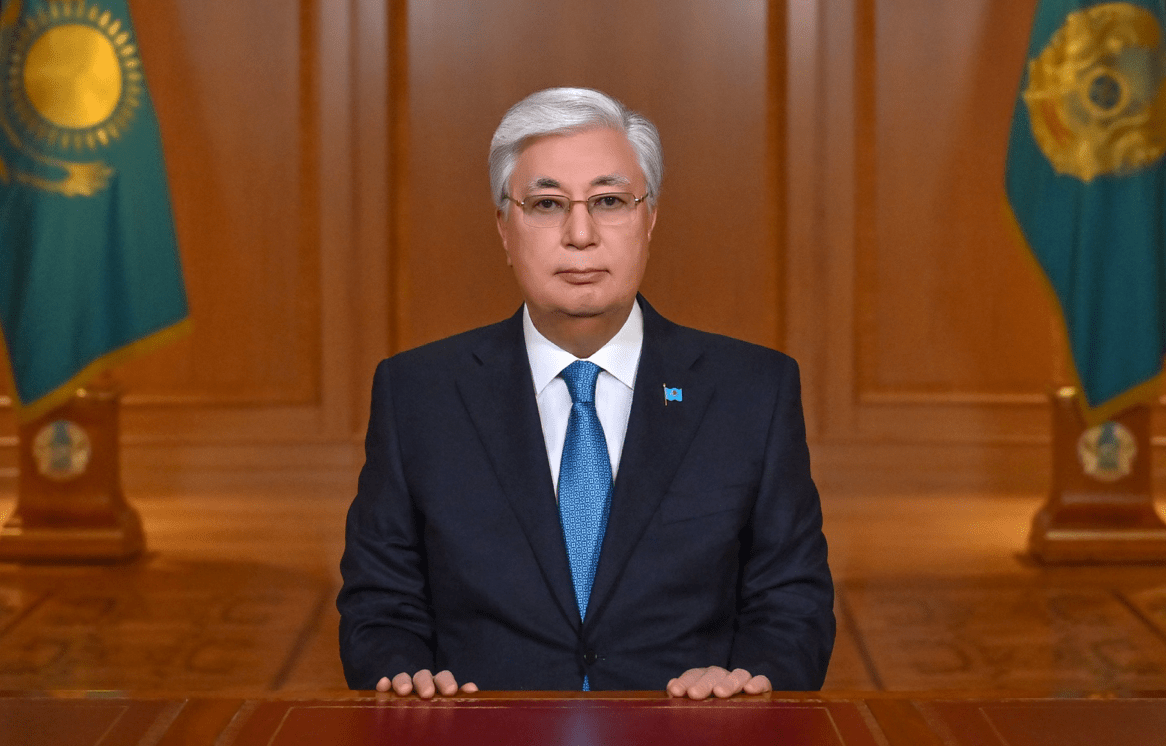 Photo Source: Akorda
Photo Source: Akorda
Kazakhstan
Kazakhstani President Kassym-Jomart Tokayev’s statement described the year 2024 as one in which “comprehensive reforms we have initiated have borne their first fruits.” He stressed the referendum to establish a new nuclear plant on the shores of Lake Balkhash as a major step forward. Tokayev also noted the large floods that had affect northern Kazakhstan this year, describing the event as one of the year’s biggest challenges, but also a source of accomplishment: “Despite the difficulties, our people demonstrated solidarity and unwavering unity. All victims were provided with the necessary assistance. The state left no one without attention.”
Tokayev underscored a number of growing economic sectors in Kazakhstan, such as manufacturing and digital technologies, as part of a “new economic course” and noted “it is necessary to open new production facilities, improve business conditions, continue building roads, and solve problems in the public utilities sector.”
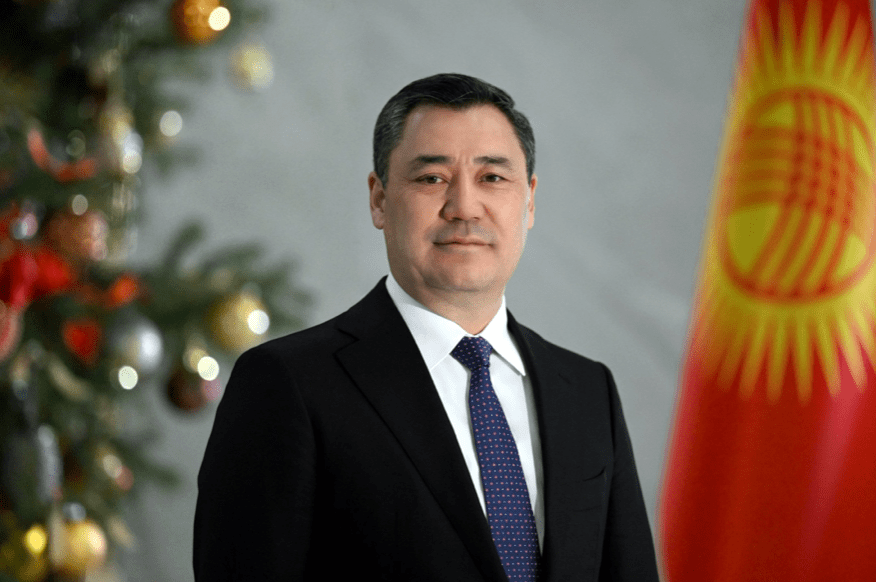 Photo Source: President of the Republic of Kyrgyzstan
Photo Source: President of the Republic of Kyrgyzstan
Kyrgyzstan
Kyrgyz President Sadyr Japarov’s remarks listed a number of initiatives and positive steps on ongoing projects that took place in 2024. Among these was laying the foundational stone of the China-Kyrgyzstan-Uzbekistan Railway, which Japarov claimed would “usher in a new era in the development of the transport infrastructure of the Central Asian region.” Further underscoring regional connectivity, Japarov stated, “God willing, this road will open up new opportunities for the development of the entire region, strengthen the economy, and improve the lives of millions of people. It will establish contacts between the peoples of the East and the West.”
In addition, Japarov referenced widespread highway repairs as well, as ongoing construction on the Kambar-Ata 1 hydroelectric power plant. He praised the demarcation of Kyrgyzstan's borders as a major accomplishment during the last year, accepting that the lack of an agreed-upon border between Kyrgyzstan and Tajikistan has been contentious and led to deadly clashes in 2022.
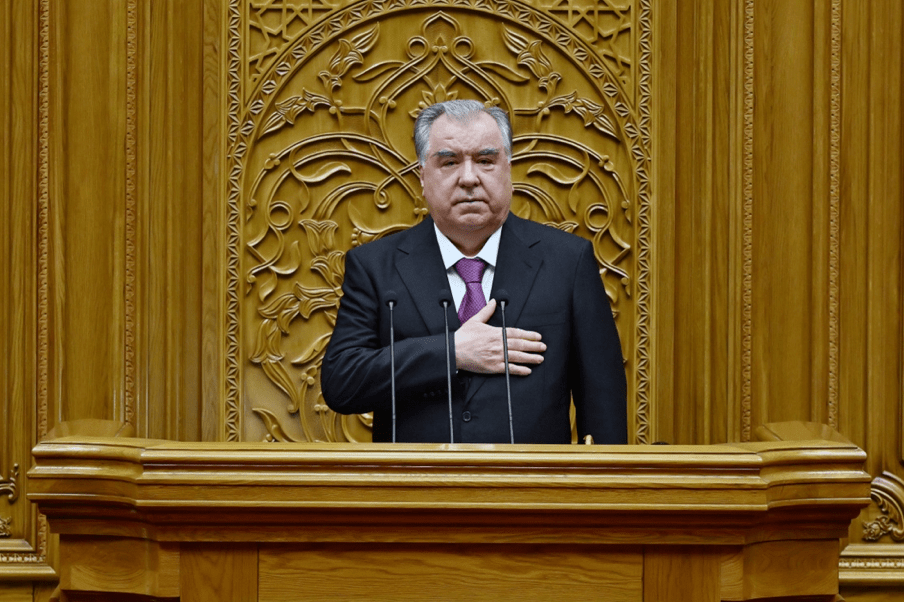 Photo Source: President of the Republic of Tajikistan
Photo Source: President of the Republic of Tajikistan
Tajikistan
Emomali Rahman, since 1991 the longest-serving head of state in the Caspian region, delivered a lengthy speech in which he recited a number of economic achievements from the last year. Rahmon reported that Tajikistan had seen real GDP growth rate of 8.4% in 2024. He also laid out ambitious plans to digitize government services, stating that by the end of 2025 he hoped to be able to provide cashless payment options for all government services. The Tajik President also declared 2025-2030 as the “Years of Development of the Digital Economy and Innovations,” emphasizing policies to promote digital innovation and entrepreneurship.
Rahmon also spoke about the country’s ongoing energy issues, stating that 2025 would see the development of a new energy plan to complete the construction of the Rogun hydroelectric dam project with six investment partners – the World Bank, the Asian Infrastructure Investment Bank, the Islamic Development Bank, the Saudi Fund for Development, the OPEC Fund for International Development, and the Kuwait Fund for the Development of the Arab Economy.
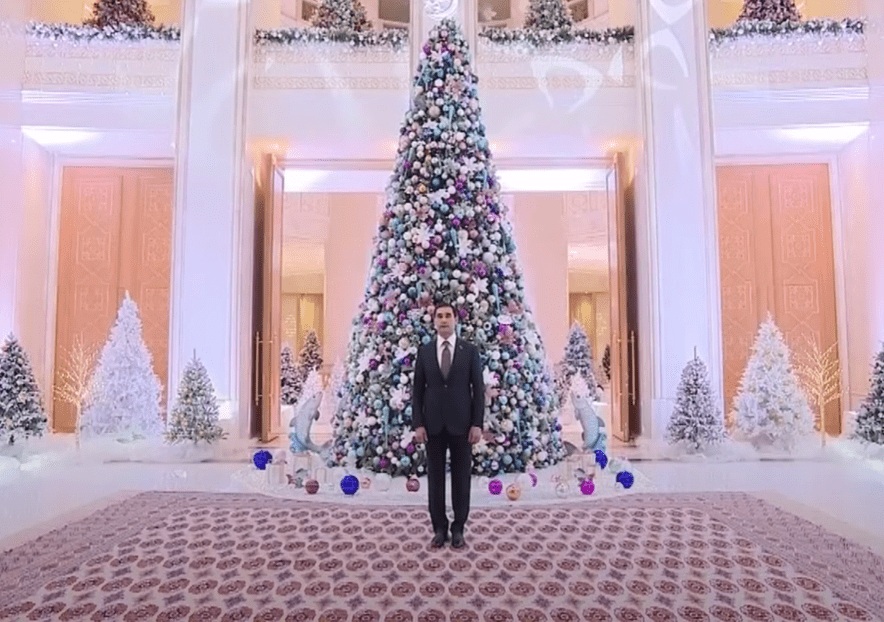 Photo Source: Turkmenistan Novostnoy Portal
Photo Source: Turkmenistan Novostnoy Portal
Turkmenistan
Turkmenistan’s President Seder Berdimuhamedov, son of the long-time leader Gurbanguly Berdimuhamedov, did not deliver a New Year’s message, but he did issue a statement on December 27 declaring 2025 as the “International Year of Peace and Trust” and touting Turkmenistan’s longstanding policy of neutrality on the international stage. The statement also noted that Ashgabat had sponsored two motions at the United Nations relating to its neutrality, one titled “2025 – International Year of Peace and Trust" and another titled “Central Asia – Zone of Peace, Trust, and Cooperation.”
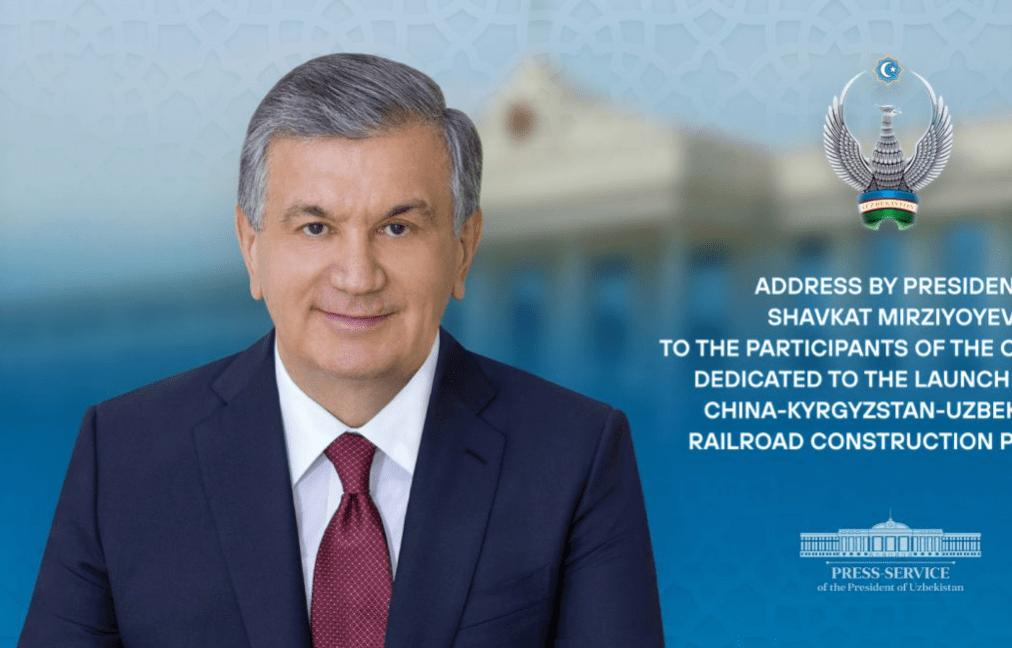 Photo Source: President of the Republic of Uzbekistan
Photo Source: President of the Republic of Uzbekistan
Uzbekistan
President Shavkat Mirziyoyev used his New Year’s address as an opportunity to present ongoing efforts to create a “New Uzbekistan,” after years of isolation and stagnation under his predecessor. Alongside political reforms, Mirziyoyev underscored growing sectors such as information technology and digital innovation, logistics and transportation, and agriculture. In refence to Uzbekistan's growing green--energy sector and environmental concerns, he declared that 2025 would be the “Year of Environmental Protection and Green Economy.”
A few days prior, on December 28, Mirziyoyev attended a ceremony celebrating the launch of construction on the China-Kyrgyzstan-Uzbekistan railway. Underscoring his commitment to regional connectivity in the coming years, Uzbekistan’s President stated, “The distance and delivery time of goods from China to European markets will reduce by several thousand kilometers and almost a week... In the long run, interlinking of this railway with the Trans-Afghan corridor will effectively connect and strengthen the transport and communication interconnectivity of China, Central and South Asia.”